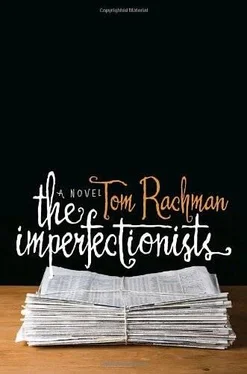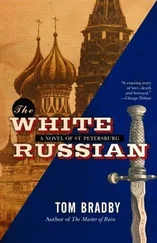The editors gave him a tryout as a proofreader, and he had a knack for it-finally, arcane knowledge and pedantry came in handy. The day of this promotion, he happened to meet Miriam at a friend's party and, inflated by professional success, found the courage to ask her on a date. In the coming months, he fell in love with her. But he worried about introducing her to his best friend, afraid that he, Herman, would wilt by comparison. Yet when Jimmy next passed through the city, Herman bravely arranged for them to meet for dinner. He was nervous all that day. Surprisingly, Jimmy seemed somewhat witless during the meal: his romantic exploits in Mexico sounded childish, his writing came off as half-baked. He spent most of the meal praising Herman, boasting of his friend's brilliance at Baltimore Presbyterian (untrue), of his sparkling college career (a gross exaggeration), and of the triumphant future that inevitably lay ahead for Mr. Herman Cohen (hardly credible). After dinner, they split up. Herman felt odd parting from Jimmy and going home with Miriam-he and his oldest friend still had all the real catching up to do.
Miriam said she liked Jimmy all right but couldn't see what Herman had been going on about. And that, Herman knew, had been the point of Jimmy's performance. He saw Jimmy off at the train station and smiled at the sight of Ulysses jutting from his luggage. "Is that the same copy from school?" Herman asked. Jimmy opened it. The pages had been cut out, and planted inside was a leather flask. "It wasn't always like that, was it?" Herman asked. Jimmy offered a sip and said how beautiful it was to see him with this girl, to see him happy. Herman blushed. "What is this poison?" he asked. Jimmy took a swig as if to double-check, then identified it as his favorite drink, Barbancourt rum.
Herman peruses the Bible on his computer screen at work, grinding a hard candy between his teeth. Ever since Jimmy arrived, Herman has turned against the Bible. It's nothing but a list of complaints-whining, organized alphabetically. No time to brood, though. He has work to do. He turns to the Sadism Hussein correction. He calls Hardy into his office.
"I thought I might have escaped," she says.
"Take a seat."
"That mistake was slipped in on the copydesk." This is every reporter's excuse.
"Who on the copydesk?"
"I'm not going to say."
"Yes, you are."
"Are you going to waterboard me if I don't?"
"Probably. Was it Ruby Zaga, by any chance? No matter. Whoever was responsible, it makes us look like nitwits. Now listen, your reporting is solid. And you write well, which is the highest praise from me. You are one of the strongest members of this staff. I hope that's been made clear to you." He taps the Sadism Hussein correction on his monitor. "But I have to think about credibility."
"I realize that. The thing is-"
"Hang on, hang on. If credibility is our goal-and at this point credibility is pretty much all we have left-then we should strive to maintain the reputation of strong staffers. So I wonder if we shouldn't let Sadism Hussein die."
"Seriously?" she says. "Thank you, thank you, thank you. I'll never use spell-check again."
"So it was you."
"And I'll memorize the dictionary, I promise."
"Dictionary, schmictionary."
"The Bible," she corrects herself. "I'll memorize the Bible."
"That's better." He dismisses her and sneaks out for lunch with Jimmy at Casa Bleve, an eatery tucked inside a sixteenth-century palazzo near Largo Argentina. "I took you here on a previous visit, remember?" Herman says. "When you came with Deb."
Jimmy frowns, but can't remember. He says he can't retain anything anymore.
"I'm the same," Herman says. "I used to have perfect recall, but my memory's shot now. I have this new technique: I write everything down. Lists. That's the answer." He's lying. His memory remains impeccable. "Long lists for everything. Consider it. It works. Any idea I have-not that what I do amounts to ideas-but any gripe I have with the paper, I jot down. Thank God I'm not attempting anything as complex as what you do. I admire that. I could never write a book." He flaps the napkin out on his lap. "Do you mind if I ask about the book? I'm wondering-and I don't want to intrude here-but I'm curious to know if you brought the manuscript. My bigger question, I guess, is when do I get to read it? And you should feel free to work on it out here, if you want. You don't have to feel obliged to meet up with me for lunch. I can leave you in the study, bring you bowls of soup, whatever. I spent years in New York bringing food and drink to writers-I know what I'm doing in this field! Seriously, though, I'd be delighted if you made some progress while you're here. And if I could be of use in looking over the thing, I'd be honored. Again, not that there's any obligation. Sorry, I'll shut up."
When Herman was offered a position at the paper in the 1970s, he hesitated: going off to Europe before Jimmy had established himself was all wrong. Then again, Jimmy wasn't even in New York anymore. His affair in Mexico had ended badly and, rather than returning to Manhattan, he had accepted a job taking publicity photographs for the equestrian circuit, traveling the United States in trucks with event technicians. He wrote infrequent memos to Herman about his wanderings. The letters were captivating, the events bizarre. Herman kept the correspondence in a cherrywood box-they'd be useful one day in the biography. He imagined Jimmy's existence: moving on a whim, walking out when jobs annoyed him, staying up all night and waking with unknown women. Herman resented it slightly, as if he were somehow footing the bill for Jimmy's freedom. Miriam encouraged Herman to take the job in Italy, especially while their daughter was young enough to make the transition. It was tempting: the paper held a cosmopolitan allure for Herman. To his mind, it was the publication that a weathered novelist or a spy might fold under his arm. And the 1970s were thrilling times at the paper, with an inventive new editor, Milton Berber, a vibrant young staff, and buoyant spirits all around. So he took the position and urged Jimmy to take advantage of the free lodgings in Rome -he could come and write his book there, full-time and for as long as he liked. (Within limits set by Miriam, naturally.)
Instead, Jimmy settled in Arizona with Deb, who weaved artisanal rugs and had an infant daughter. He married Deb, adopted the girl, and, to bring in money, qualified as a paralegal. Herman was disappointed when he finally met Deb-he'd expected a marvel, and she wasn't that. It rankled that Jimmy should be detained by mediocrity in Arizona when he could have been sparkling in Rome. Herman could easily have got Jimmy hired at the paper, and he'd repeatedly offered to do so.
When the bill comes for their lunch at Casa Bleve, Jimmy pulls out his credit card.
"No, no," Herman says. "This is mine. I'm the one with the job."
But Jimmy insists.
"Okay, how about this then," Herman says. "I'll let you pay on one condition: that you write something for me-an article, any kind you like-and I get to print it in the paper. What do you say? Obviously, we'll pay you, though I'm afraid we have a lousy freelance rate these days after all the budget cuts. But you can write about anything. An opinion piece, something funny-anything. It'd be a real feather in my cap to publish you. How's that sound?"
That night, Jimmy sits before the computer, leaning his gaunt face into the screen, slender fingers hovering above the keyboard. Herman leaves him there, closes the door, and shakes his fist triumphantly. As the hours pass, Herman paces back and forth in the kitchen, nervously eating slices of homemade lemon-pistachio polenta and browsing cookbooks. He approaches the computer room, places his ear to the door, hears the slow tapping of fingers on the keyboard. It is almost 2 A.M. when Jimmy emerges. The article is there on the screen, but he can't figure out how to work the printer. He's tired, says good night, goes to bed.
Читать дальше












